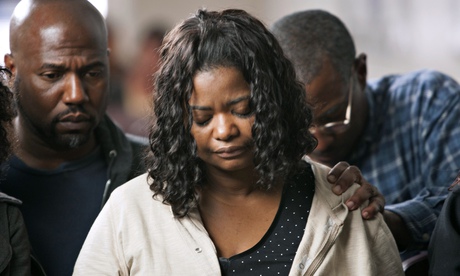
When Ryan Coogler’s debut, Fruitvale Station (Spirit Entertainment, 15), split opinion at Sundance last year, the ensuing critical debate proved noisier than the film’s belated UK release. It’s worth seeing for reasons of argument alone, particularly on DVD, which flatters its brightly modest aesthetic, but I remain in the unconvinced camp.
Coogler’s dramatisation of the last day in the life of Oscar Grant, a young black father shot dead by a white Bay Area cop on New Year’s Day 2009, is short, sincere and gracefully acted, yet there’s something discomfitingly artificial about its version of the truth. Compressing and occasionally fabricating details of Grant’s existence, the film fashions its story as one of a flawed, working-class hero; Grant may well have been that, but his construction as a character invites viewers to feel worse about an unarguable atrocity than they would do otherwise. With echoes of the Trayvon Martin case contained in its fury, this is compelling but emotionally irresponsible film-making.
It’s still a more urgent take on a true-crime tragedy than Atom Egoyan’s disappointingly utilitarian Devil’s Knot (EV, 15), which brings little to the grimly fascinating story of the West Memphis Three, the trio of American teenagers unjustly convicted of child murder in 1993, which hasn’t been covered in the comprehensive Paradise Lost documentary trilogy. Colin Firth is nobly miscast as the southern PI who helped crack the case open, while a more interesting arc goes to Reese Witherspoon, fine and flinty as the lone doubter among the victims’ parents, but the film can’t commit to a point of view.
More recent headline news is fused with fictional melodrama in Hany Abu-Assad’s Oscar-nominated Omar (Soda, 15), an effective thriller about a young Palestinian baker (the promising, arrestingly handsome Adam Bakri) forced by the Israeli authorities to become an informant after participating in the execution of a soldier. Essentially mirroring the narrative of the still-unreleased Israeli film Bethlehem, it’s tight, thoughtful, slightly over-tidy discussion cinema.
Big-studio animated features come down the pike with such frequency these days that I had entirely forgotten Mr Peabody & Sherman (Fox, U) by the time it arrived on DVD. Not that there’s much to remember about this glib, perky recycling of the eponymous 1960s cartoon sideshows, despite the bewildering premise of a genius time-travelling dog fighting for custody of his adopted human son.
There’s man-and-boy bonding of a more conventional sort in David Gordon Green’s effortfully grimy backwoods thriller Joe (Curzon, 15). It’s been heralded as an artistic comeback for Nicolas Cage, which is to say he goes less nuts than usual in it, though I’m not sure how much that works in his favour. He merely seems dedicated and stifled as a grizzled ex-con forester who becomes an unlikely mentor to a headstrong teen: it’s Mud redux, then, with additional stagnant water odour.
That still makes it more fragrant than Seth MacFarlane’s wretched western spoof A Million Ways to Die in the West (Universal, 15), in which the Ted creator plays a milquetoast sheep farmer who falls for a ruthless gunslinger’s girl. Anti-Islam jokes and spatters of literal excrement notionally modernise material that would have seemed too hoary for Blazing Saddles.
Heading directly to DVD (and, potentially, slow-burning cult status), Jack Plotnick’s Space Station 76 is considerably funnier as a genre parody, not least because the genres it is sending up are themselves so incompatible. Half macho, mustachioed 1970s space opera, half doleful, mustachioed 1970s relationship drama in the Carnal Knowledge vein, it’s wholly, winningly bizarre, earning extra points for giving the chronically underused Patrick Wilson something to do.
The 70s are recalled with a straighter face, meanwhile, in Guillaume Canet’s swollen, Scorsese-aping Blood Ties (Lionsgate, 15), a James Gray-scripted New York crime melodrama that betrays its French director’s lack of familiarity with the territory, but has its moments — most of them belonging to Belgian up-and-comer Matthias Schoenaerts.
The week’s best box set arrives neatly in time for any Only Lovers Left Alive converts who have caught the Jarmusch bug: the Jim Jarmusch Collection (Soda) gathers the American weirdmeister’s first (and largely best) six features, from 1980’s Permanent Vacation to 1995’s Dead Man (now there’s a postmodern western to treasure) on beautifully mounted Blu-ray with a fair scattering of extras; it’s one for many cinephiles’ early Christmas lists.
The small-screen scene was been abuzz last week with the news that David Fincher, fresh from Gone Girl, will direct every episode of HBO’s US remake of Channel 4 sensation Utopia. If you’re insufficiently familiar with the original to be neither excited or dismayed, Netflix has helpfully chimed in with the first series of Dennis Kelly’s violent, conceptually ornate genre hybrid. It’s fascinating stuff that hardly requires translation into American, though it offers more than enough sick, slick potential for a 13-hour Fincher film.

